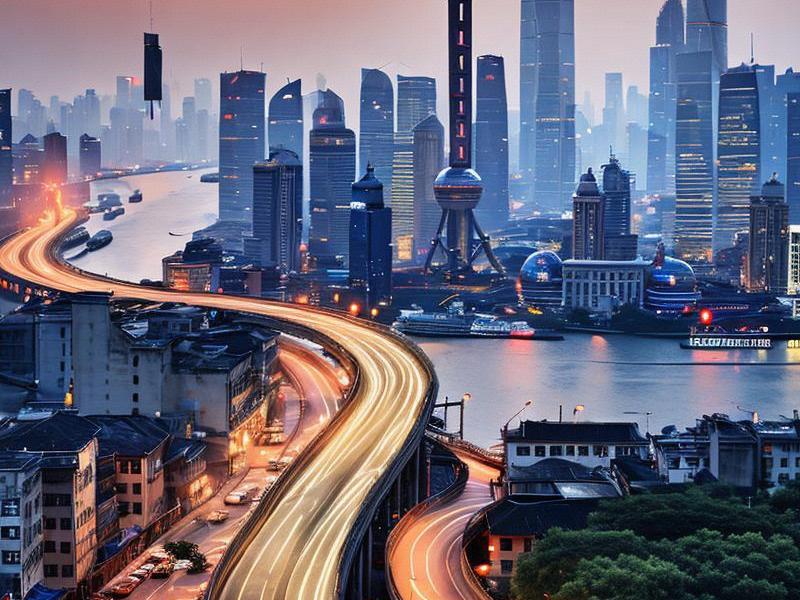
Shanghai, the largest city in China, has long been a symbol of the country's economic and social progress. Over the past few decades, it has undergone a remarkable transformation, evolving from a traditional port city into a global financial hub and a center for innovation and culture.
The urban landscape of Shanghai is a testament to its rapid development. The iconic skyline, dominated by the Oriental Pearl Tower, the Shanghai Tower, and the Jin Mao Tower, is a visual representation of the city's economic prowess. These skyscrapers, along with the historic Bund and the futuristic Pudong area, showcase the harmonious blend of tradition and modernity that defines Shanghai.
Economic transformation has been a cornerstone of Shanghai's success. Once a major center for trade and commerce, the city has embraced globalization and technological advancements to become a leading financial hub in Asia. The Shanghai Stock Exchange is one of the largest in the world, attracting investors from around the globe. Additionally, the city's free trade zone has facilitated the growth of international businesses, making Shanghai a key player in global trade.
The economic boom in Shanghai has also spurred innovation and entrepreneurship. The city is home to numerous high-tech companies, research institutions, and startups, particularly in areas such as artificial intelligence, biotechnology, and green energy. This vibrant innovation ecosystem has positioned Shanghai as a frontrunner in China's drive towards becoming a global leader in science and technology.
上海龙凤419社区 Cultural diversity is another defining feature of Shanghai. As a city that has historically welcomed people from all over the world, Shanghai boasts a rich tapestry of cultures, languages, and traditions. The city's cosmopolitan atmosphere is reflected in its diverse neighborhoods, where one can find everything from French Concession's charming cafes to the bustling markets of Yangpu District.
Shanghai's cultural scene is thriving, with world-class museums, theaters, and art galleries. The Shanghai Museum, renowned for its extensive collection of Chinese art, attracts millions of visitors each year. The city's vibrant theater district offers a wide range of performances, from traditional Chinese opera to contemporary plays and musicals. Additionally, Shanghai's art galleries and cultural festivals provide a platform for local and international artists to showcase their work, fostering a dynamic cultural exchange.
The city's commitment to preserving its historical heritage is evident in the numerous historic sites and landmarks scattered throughout Shanghai. The Yu Garden, a classical Chinese garden built in the Ming Dynasty, offers a glimpse into the city's rich history. The Shanghai Old Town, with its narrow streets and traditional architecture, provides a contrast to the modern skyscrapers of Pudong.
Shanghai's growing global influence is reflected in its role as a major center for international diplomacy, trade, and culture. The city has hosted numerous high-profile international events, including the World Expo in 2010, which attracted millions of visitors from around the world. These events have not only enhanced Shanghai's global profile but also fostered international cooperation and understanding.
上海夜生活论坛 The city's strategic location on the East Coast of China, along the Yangtze River Delta, has made it a key player in regional and global economic integration. Shanghai serves as a gateway to China's vast market, attracting foreign investment and facilitating trade with other countries. The city's well-developed infrastructure, including its international airports, seaports, and high-speed rail network, further enhances its connectivity and competitiveness.
In recent years, Shanghai has also been at the forefront of China's efforts to promote sustainable development and environmental protection. The city has implemented various initiatives to reduce pollution, improve air quality, and promote green energy. For example, the development of the Zhangjiang Hi-Tech Park has focused on fostering clean and innovative industries, while the city's extensive green spaces and urban forests provide residents with a healthy and sustainable living environment.
Shanghai's commitment to education and talent development is another key factor in its success. The city is home to some of the best universities and research institutions in China, attracting top talent from around the world. These institutions play a crucial role in driving innovation and economic growth, while also fostering a culture of learning and research.
上海喝茶服务vx The city's government has also taken significant steps to enhance the quality of life for its residents. Initiatives such as the construction of affordable housing, the improvement of public transportation, and the promotion of cultural and recreational activities have contributed to a more livable and vibrant city. Additionally, Shanghai's efforts to promote social equity and inclusion have helped crteeaa harmonious and diverse community.
As Shanghai continues to grow and evolve, it faces several challenges, including managing urbanization, addressing environmental concerns, and ensuring sustainable economic development. However, the city's resilience, innovation, and commitment to progress position it well for the future.
In conclusion, Shanghai is a dynamic metropolis that is shaping the future of China and the world. Its rapid urban development, economic transformation, rich cultural diversity, and growing global influence make it a unique and influential city. As Shanghai continues to embrace change and innovation, it will undoubtedly play a pivotal role in shaping the global landscape.
